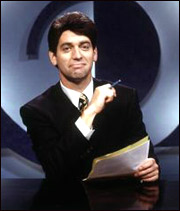 Keith Windschuttle’s appointment to the Australian Broadcasting Corporation board is obviously meant to provoke, and I’ll refer those seeking outrage (or right-wing taunts) to Larvatus Prodeo. Or back to Windschuttle himself in his younger, leftier days, in his book The Media[1]:
Keith Windschuttle’s appointment to the Australian Broadcasting Corporation board is obviously meant to provoke, and I’ll refer those seeking outrage (or right-wing taunts) to Larvatus Prodeo. Or back to Windschuttle himself in his younger, leftier days, in his book The Media[1]:
For the same reason, I don’t expect the ABC to suddenly start re-editing old docos about Tasmanian demographic history or headhunting Naomi Robson to replace Kerry O’Brien on the 7:30 Report. The Fraser government also “appeared to have pursued the organisation with a surprising vindictiveness” [p144], but the result was a 28 per cent real budget cut and restructuring rather than an editorial overhaul. Likewise, it seems now that the main purpose of the government’s board-stacking is to clear the ground for ads on the ABC.Some conservatives, as is well known, have often described the ABC as a hotbed of radicalism. However, as one would expect from a state broadcasting organisation which for the greatest period of its existence has operated under conservative governments, the ABC hierarchy leans distinctly to the right. It has recruited and promoted many people of the same political persuasion. The hierarchy does not, however, see its values reflected in every programme because the nature of radio and television broadcasting means that production staff always have some room to exercise their judgement and opinion, and this can never be controlled completely. [p143]
In Windschuttle’s now famous speech (sorry, his Earle Page Memorial Oration) last year, he said that the solution to a degenerate left-wing culture was to commercialise all public cultural outlets:
The government should put all these institutions on a commercial footing. SBS already takes television commercials, without any apparent detriment to its operation, so the ABC should do the same. As the readership of the Fairfax press and the sizeable audiences attracted to the various arts festivals, to John Pilger lectures, and to productions like Three Dollars and Two Brothers all demonstrate, there are now many well-heeled people who consume these cultural products. If it were commercialized, the ABC would not only survive, it would probably thrive.There’s a contradiction in arguing both that commercialisation is a solution to degenerate left-wing culture and that this same degenerate left-wing culture would thrive in commercial conditions anyway. But there are good reasons to believe that commercialisation would be a disaster for the ABC. As the younger Windschuttle said:
The news and entertainment content of the media, then, is mainly determined not by considerations such as ‘editorial integrity’ or ‘quality entertainment’ but primarily by what will attract the target audience that management wants to offer to advertisers. Certain audiences are targeted on the basis of the income they have to spend, their buying habits and the volume of advertising money that is available to direct at them. A newspaper or television news bulletin may emphasise its editorial integrity but it will do this only if it is seeking an audience among the well-educated, up-market audience that finds this important… If media attract the wrong audiences… they will have to change their format or fold. [p9]Commercial, ad-funded TV has proven itself unable to target niches very well, and quality is unfortunately a niche. When a station is advertising dependent, there’s always going to be pressure to chase a lower common denominator, or to sacrifice prime time to the ratings gods to maintain independence elsewhere. It’s a slippery slope. Anyone who has lived in New Zealand knows what a commercial-dependent public broadcaster is like – no different from a private broadcaster, and mostly crap.[2]
Back to last year’s Oration:
There is also the question of equity: why should those of us who don't care for the offerings of Radio National, Triple J or the 7:30 Report subsidise others to get their political entertainment commercial free?But the younger Windschuttle spent several pages [15-18] dealing convincingly with this argument, pointing out that we pay for advertising anyway through the cost structures of the things being advertised. That’s a regressive tax.
The rest of Windschuttle’s argument comes down to spite:
And why should Derryn Hinch and Dave Gray be the only ones reduced to doing television commercials for toilet paper and erection problems, when the ABC's Phillip Adams and Kerry O'Brien could do them just as well?Now, the ABC is far from perfect. Journalistic ethics, even at their best, still tend to make news a conduit for received opinions and reflect the social structure rather than question it. Again, I refer you to Windschuttle (1989):
The ABC has a charter to provide ‘adequate and comprehensive’ programmes, which it has interpreted liberally.… It has aimed at a slightly up-market but still mass audience…. It is the nature of mass programming, with an up-market skew, that is more an influence on the politics of the ABC than anything else. [p143]But it’s still better than the alternative. It is worth defending the idea of publicly funded independent media from the idea that the market should be the arbiter of our news and entertainment. It is ironic that public funding for the media is being put under such pressure even as the ad-funded model of private television starts to show the strain of digital evasion.
Footnotes


